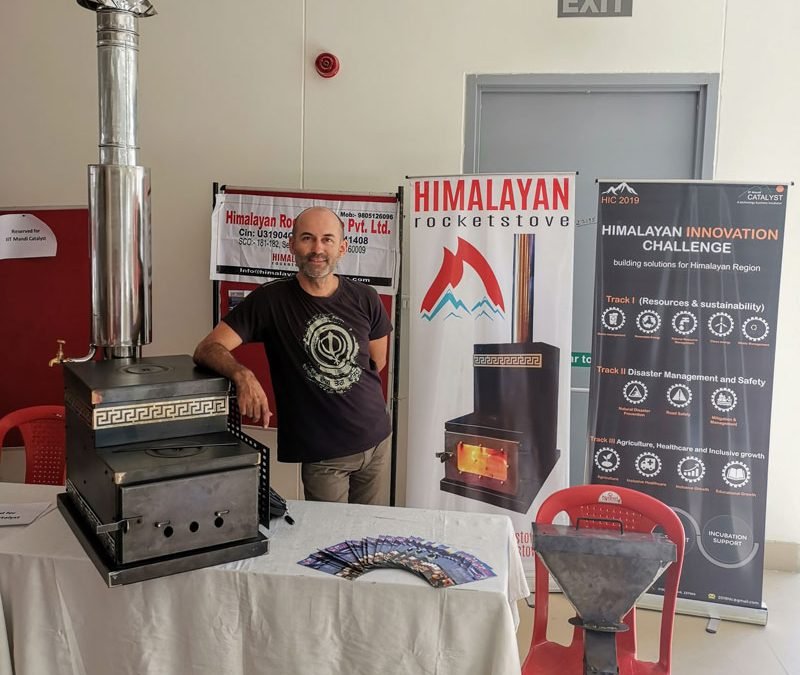Progress Report
I’ve just arrived back in Australia after an incredibly full 3 months working on the HRS project. The threads that began weaving 3-4 years ago have started to meld and merge with immaculate timing. Lots has happened in the last month, so I’ll move quickly through the highlights (although its still quite a long read).
Baddi to Parwanoo
We found a great new warehouse in a much better location that is closer and easier for our customers, as well as being in a better climate with cleaner air. We have the middle floor of a 5-floor building that is at street level on the side that matters to us, and which has a massive Shiva Lingam built into the side that faces away from the street. Where else but India would you find a warehouse with a 45 foot black religious representation of Lord Shiva’s Penis? It certainly stands out… put it that way.
As a result, I also got to move out of Baddi… YAY! Baddi is the textbook definition of a shit hole. Hot as Hades with a strange black metallic dust that blows under the doors and coats everything inside the apartment with a shitty grittiness (or is that gritty shittiness?).
I moved to a nice 2 bedroom house in Parwanoo with a small garden and a large terrace, just a few minutes walk from the 6000 sqft warehouse we have been busy transitioning to. The boys worked their arses off, Abhishek in particular, getting everything packed up from Baddi, loading trucks in the blazing heat and unloading in the less blazing but still sweat inducing warmth of Parwanoo.
The owner is an NRI (Non Resident Indian) who lives in Melbourne, and when he heard that an Aussie was going to rent his building, he came over to personally make sure everything was attended to properly. It was through him I managed to seamlessly move into a nice house next to the warehouse exactly on the day the lease was up on the apartment in Baddi.
Parwanoo itself is about 1 hour outside Chandigarh on the Shimla highway, just inside the state border of Himachal Pradesh. It’s one of major routes for our customers from Shimla region, Kinnaur and Spiti and has one of the largest apple markets in the state. Apple growers are a perfect market for us, so this gives us a perfect chance to demonstrate the Eco Rocket Stoves to them directly with a stall at the apple market.
Pine Needles To Pellets
We were shortlisted for the Himalayan Innovation Challenge hosted by IIT Mandi, a modern high level govt. institute tucked away in the foothills on the way towards Manali. We had anyway wanted to visit IIT Mandi as they were conducting experiments in converting pine needles into a useful biomass fuel in the form of pellets of various sizes. Through our contact with Prof. Arti who was heading up the project, we were also invited to visit the pellet team and see their plant in operation.
Abhishek and I drove up with the Gypsy (my little 4×4 go anywhere vehicle) fully packed with Eco Rocket Stoves and accessories. We stopped on the way and did a demonstration in a village where the pine needle pellets were being made, showing the locals and the IIT Mandi team our prototype pellet burner working with their pellets.
The HP Govt has been funding their project with a view to setting up 25 pelletising plants around HP, but until we showed up, they had no way of burning the pellets in a domestic household situation. Our pellet feeder fundamentally changes the way biomass combustion can happen in a domestic setting.
Using pellets makes the Eco Rocket Stoves 100% renewable and non-degrading to the environment. In fact, the pine needles are in such abundance that people start forest fires just to burn off the needles that carpet the ground. (Pine plantations are a result of a misguided reforestation program from 30-50 years ago where non-native pines were planted instead of indigenous trees… but that’s another story).
Needless to say, there was considerable excitement by both the IIT Mandi pellet team as well as the Himalayan Innovation Challenge panel. We were considered too advanced to win any of their incubation based prizes, as we are well into our commercialisation process, but we are in talks on ways we can work together, either on this or future projects such as the waste incineration project.
Shimla and the Pollution Control Board
The PCB (Pollution Control Board) had already sent 3 members to visit us in Baddi, to see for themselves our non-polluting combustion heating, and so it was at their instigation we were invited to attend an exclusive presentation on World Environment Day in Shimla, attended by the Chief Minister. He was guided quickly through the various displays, and when he reached us he smiled with recognition and said at the end of the short demonstration he had already decided he would be getting one for his own home.
Various departmental heads were in attendance and without even asking, we had 2 departments arguing over who was going to be giving us subsidies to scale out to the Tribal Belt of HP. They requested I submit a proposal for this as soon as possible, which has now been done and we are waiting to finalise the details for this.
Scaling
Our new production partner has successfully demonstrated it can make the Eco1 Rocket Stove well, and we have locked in a very attractive production rate as well as improved quality control, assembly and volumes. Combined with our existing production partner, we are confident about our ability to achieve the volume requirements over the coming years.
The additional warehouse space with 5 partitioned areas allows us to set up an office, shop, prototyping workshop, testing laboratory as well as storage space for over 1000 units. We have already begun setting up the workshop space and this is very exciting for me, as my real interest in this whole process is the design and development of new ideas. Getting the company to be a financially successful venture is a necessary part of the process so I can step back, appoint a manager and get back into the workshop. Without the subsidies we are looking at a target of 2000 units up to March 2020, and with subsidies, this could be doubled and we have the infrastructure in place to deal with it, in terms of production, storage and distribution networks.
We will have to grow the team, and I have already got the whole team looking for juniors to bring into the organisation so that we can deal with rapid growth and train up the next batch of the HRS family. We are particularly looking to employ more women, so as to improve our gender balance.
The Himalayan Eco Store
And now for the next piece of the puzzle… one of our weaknesses as a company is that we currently only make and sell winter products, which gives us cash flow issues through the summer months. In order to smooth this, and to take advantage of the fact that we are developing a network of retail outlets where we are anyway paying rent and in some cases year round salaries, it makes sense to introduce summer based products.
Originally I was going to design these myself, but in the meantime, it makes sense to become a retailer of third party products that fit our customer demographic. This means anything that is ecologically oriented and which would be useful for farmers and householders in the Himalayas.
We have a list of such products ready to start sourcing, and we will set up the first flagship Himalayan Eco Store in one of the sections of our warehouse in Parwanoo, where it will cost us nothing extra for rent. This will bring more people through our stores, as well as give us an opportunity to showcase eco based products, such as organic agro products for apple growers, composting kits, solar torches, rocket based camp stoves, and various other such goodies.
I have tested the concept on a number of people from our target regions and everyone is excited about it, as there is currently nothing like it. During the winters we will of course feature our own products, and in the summer we will keep them in the back of the store on display and feature other more seasonally useful options. Stay tuned for www.himalayanecostore.com (I’ve got the domain, and will put up a site shortly).
Rocket Man Designs
As mentioned previously, this is my new Australian venture that will work closely with HRS. The plan is to develop new technology for developing world conditions, and to test these designs in the Indian market place via HRS. Once we have established that a design is viable for commercialising we will then be able to explore various global markets that need the solutions we are developing and licence the designs for local production and distribution in those regions.
Rocket Man Designs is Australian owned and based so that we can look for social impact funding from Australian friendly sources to get this up and running. Get in touch if you have any ideas about this, or if you’re interested to get involved in a practical way. I will be looking to build a team around the Byron Bay region, including a CAD software wiz and a mechanical engineering person. Not offering employment just yet, but if you’re interested in working up ideas into practical solutions that solve real problems in the developing world, let’s talk.
A quick overview of what has been done so far can be seen here: www.rocketmandesigns.com
Regards,
Russell Collins
Director – Himalayan Rocket Stove
russell@himalayanrocketstove.com


Hi, I tried contacting you through website, but there was no answer.
I have been in contact with the environmental manager at Palpung Sherab Ling monastery, in Bir, HP. He has a problem with trash, specifically plastics. They are currently burning them, but I understand it is not very safe at low temperatures, because of the toxins resulting from incomplete incineration.
I have been reading around on the internet about using Rocket Stoves for incineration, and wonder if you have experience in this, and if you are able to build a stove for this purpose that would be large enough to service an institutional sized community (1000+ people) like Palpung Sherab Ling.
Please let me know,
Thank you,
Dwight Owens
Victoria, Canada